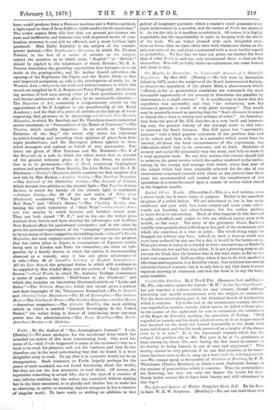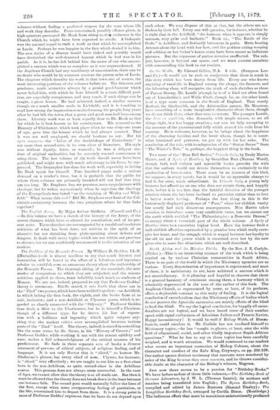volumes without feeling a profound respect for the man whose
life and work they describe. Fears entertained, possibly offence given, in high quarters prevented Dr. Hook from rising to that eminence in the Church which he might have been expected to attain. A bishopric was the natural sequel to such a work as that which he accomplished at Leeds. Perhaps he was happier in the fate which denied it to him. The new duties of a diocese would have risked and possibly would have diminished the well-deserved honour which he had won in his parish. As it is, he has left behind him the name of one who accom- plished a success which was as complete as it was unprecedented. If the Anglican Church had any machinery of canonisation, there can be no doubt who would be by common consent the patron saint of Leeds. The chapters which describe his work in that town are, of course, the most interesting portions of the volumes before us. The firmness and prudence, made attractive always by a genial good-humour which never failed him, with which he bore himself in a most difficult posi- tion, are especially conspicuous, and may teach, if such things can be taught, a great lesson. He had achieved, indeed, a similar success, though on a much smaller scale, in Lichfield ; and it is touching to read how strong the impression remained among his people, long years after he had left the town, that a great and good man had been among them. Literary work was ut least equally dear to Dr. Hook as that for which he is best known to his countrymen. His removal to the Deanery of Chichester, which took place when he was sixty-one years of age, gave him the leisure which he had always coveted. That it was not well employed, we should hesitate to say. But his opus magnum, the "Lives of the Archbishops of Canterbury," is not more than second-rate, in its own class of literature. His style was without dignity, force, or warmth ; he was a diligent stu- dent of original authorities, but he certainly wanted correctness in using them. The last volume of the work should never have been published, and might now, with much advantage to his fame, be sup- pressed. The biographer has done his work well, especially in letting Dr. Hook speak for himself. Nine hundred pages make a serious demand on a reader's time, but it is probable that the public for whom these volumes are primarily intended will not feel that they are too long. Mr. Stephens has, we presume, some acquaintance with theology, but he writes mysteriously when be says that the theology of the Evangelicals was based "on the teaching of Wesley and Whit- field." What means this and ? Did Mr. Stephens ever hear of the Cal- vinistic controversy between the two preachers whom he thus links together ?



































 Previous page
Previous page